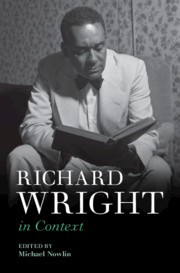Book contents
- Richard Wright in Context
- Richard Wright in Context
- Copyright page
- Contents
- Figures
- Contributors
- Abbreviations
- Richard Wright’s Works: A Chronology
- Introduction Richard Wright’s Luck
- Part I Life and Career, Times and Places
- Part II Social and Cultural Contexts
- Part III Literary and Intellectual Contexts
- Part IV Reputation and Critical Reception
- Chapter 29 Wright’s Many Lives and the Travails of Literary Biography
- Chapter 30 Contemporary Reception
- Chapter 31 Native Son on Stage and Screen
- Chapter 32 Wright’s Critical Reputation, 1960–2019
- Chapter 33 Richard Wright in the Era of #BlackLivesMatter
- Index
Chapter 33 - Richard Wright in the Era of #BlackLivesMatter
Two Views
from Part IV - Reputation and Critical Reception
Published online by Cambridge University Press: 08 July 2021
- Richard Wright in Context
- Richard Wright in Context
- Copyright page
- Contents
- Figures
- Contributors
- Abbreviations
- Richard Wright’s Works: A Chronology
- Introduction Richard Wright’s Luck
- Part I Life and Career, Times and Places
- Part II Social and Cultural Contexts
- Part III Literary and Intellectual Contexts
- Part IV Reputation and Critical Reception
- Chapter 29 Wright’s Many Lives and the Travails of Literary Biography
- Chapter 30 Contemporary Reception
- Chapter 31 Native Son on Stage and Screen
- Chapter 32 Wright’s Critical Reputation, 1960–2019
- Chapter 33 Richard Wright in the Era of #BlackLivesMatter
- Index
Summary
The first brief essay argues that although the body of Richard Wright's works, his legacy, retains a special relevance in multiple discourses about human and civil rights, systemic racism, and transnational efforts to address global social injustice, it is dangerous, both in traditional scholarship and in non-academic commentary, to incarcerate his works within a single ideology or within the framework of current ideologies that give special credibility to #BlackLivesMatter. Indeed, such a framing of legacies may lead critics to be complicit in producing confusion and error which serve to undermine the primal strength of Wright's legacy: the exceptional value of asking questions that provoke pragmatic responses rather than seemingly definitive answers. We ought not abandon the dialectics of the concrete and the dialogic of the imaginary as we argue for the value of Wright's legacy in temporal evolutions. The essay draws special attention to the vexed efforts of Christopher J. Lebron to explain the origins of #BlackLivesMatter. Dealing adequately with Wright's legacy involves a willingness to engage the problematic of what Roseann Liu and Savannah Shange propose is thick solidarity, the willingness to respect the layering of " interpersonal empathy with historical analysis, political acumen, and a willingness to be led by those most directly impacted as the subjects and the objects of history. The second essay tentatively concludes that we continue to examine and re-examine Wright's legacy inside of and outside of #BlackLivesMatter. Richard Wright’s class-conscious writings of the 1930s-1940s makes use of Marxism to help us think through the relationship between the individual and the social totality; race and class; “black lives” and “all lives.” In what sense is Bigger Thomas a “native son”? How do the hands in “I Have Seen Black Hands” relate to the laboring hands of the rest of the working class? Wright’s revolutionary communist standpoint, mediating between the particular and the general, what is and what can be, requires us to think dialectically past the limitations of a reformist politics of redistribution and inclusion.
Keywords
- Type
- Chapter
- Information
- Richard Wright in Context , pp. 348 - 357Publisher: Cambridge University PressPrint publication year: 2021



